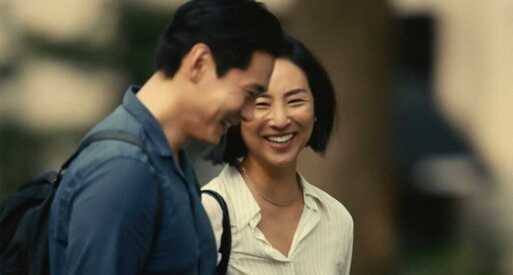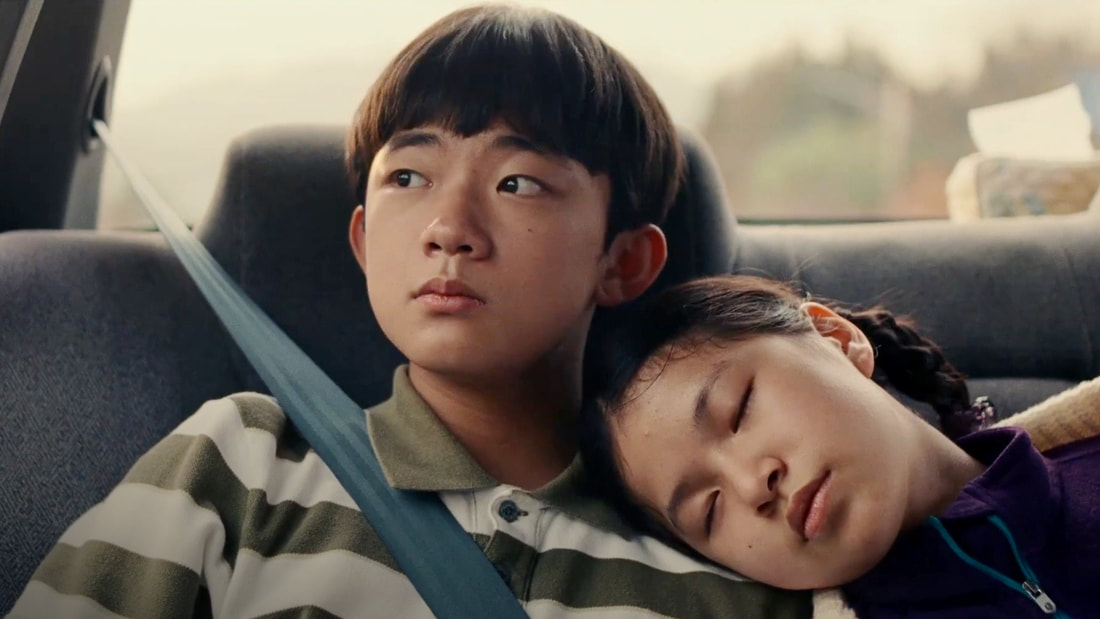After Hours Film Society Presents
Past Lives
Aug 28 | 7:30 pm

Reviewed by Bill Goodykoontz | Arizona Republic
“Past Lives isn't just a great film. It may be a perfect one — and the best of 2023 so far.”
Summer is so often the season of big franchise films about transforming whatevers and speedy superheroes, and that’s fine.
School’s out, the brain can use a little vacation.
In that context, it’s tempting to describe “Past Lives,” writer and director’s Celine Song’s perfect little movie (in her debut!) as a welcome alternative to all the bombast. But that sells it criminally short, because this is a movie for any season. Emotionally engaging from the start, bolstered by brilliant performances and held together by Song’s understated direction that weaves timelines together flawlessly, it’s more than just good.
It’s what a movie should be. And I absolutely loved it.
The film tells the story of Nora (Greta Lee) and Hae Sung (Teo Yoo). We first see them sitting in a New York bar with another man, with off-screen voices wondering what the dynamic between the three is. Song spends the rest of the movie showing us.
The film flashes back 24 years, when a young Nora, then called Na Young, and Hae Sung are walking home from school in Seoul. She’s crying. For once, he beat her score on a test. It’s clear the two are close; in fact, Na Young tells her mother she will “probably” marry Hae Sung one day. “He’s manly,” she explains.
But Na Young and her family are moving to Canada (Na Young and her sister choose their own English names). While it's an exciting adventure for Na Young, it’s too much for Hae Sung, who wasn’t aware his friend was leaving. Her curt goodbye doesn’t help. The two lose touch.
We move ahead 12 years. Nora is an aspiring playwright in Toronto. On a whim, Nora looks Hae Sung up on, where else, Facebook. Surprised, she finds that he has asked on his timeline if anyone knows her whereabouts. She reaches out, and soon the two are conducting long video chats, catching up, a spark still there through the dozen years and thousands of miles.
Hae Sung has completed his mandatory military service and is studying engineering. We see them living their lives between video chats, him out drinking with his friends, her writing and studying (she’s in an MFA program). But the connection is what consumes them.
So much so that Nora abruptly puts a stop to it. “I want us to stop talking for a while,” she says. She’s distracted from her studies, her work — the ambition that caused her to cry in Seoul has never disappeared.
Of course a while turns into much longer. Catching up with the characters another 12 years later, Nora is a playwright in New York, living with her husband Arthur (John Magaro), a writer. They married so she could get a green card, but now their love is real, and affecting. (The way Song orchestrates their meeting at a writers’ retreat is masterful — underplayed and real, like everything else in the film.)
But Hae Sung, after all these years, is finally coming to visit in New York. Nora downplays it, but Arthur is understandably a little jealous, a little worried, but also an exceedingly good sport about the whole thing.
Hae Sung is nervous. He and his girlfriend have ended a serious relationship. What does he want out of this meeting? Nora insists to Arthur it’s just a reunion of old friends. Arthur isn’t so sure.
Of course it’s many things. Song stages the initial reunion beautifully, with Hae Sung sweating over how he looks. Nora is more confident — after all, this is her city, her home turf. Hae Sung is in a strange land pursuing an old dream: her.
A couple of times Song employs what in theory sounds like a cliched technique. When we see Hae Sung and Nora in the present, she cuts, only for a second or two, to the past, when they were children, in scenes that echo each other. It’s breathtakingly moving, whether because of how brief the callback shots are or because of how effectively they illustrate the strength of the imprint that moments in our past lives still have on us. Both, probably.
Yoo has the most thankless role, the far-away forgotten friend pining away, but he brings a vulnerability to the character that plays off his past, always in pursuit of Nora, either academically or otherwise.
Magaro has a trickier task, and executes it flawlessly. His Arthur could have been comic relief or nothing more than a conveniently placed dramatic obstacle. Instead he allows us to see Arthur’s genuine love for his wife. He is trying to learn to speak Korean, because when Nora talks in her sleep, it’s in her home language.
But this is really Nora’s story, and Lee fully inhabits both the confidence she has had to build as an aspiring artist in New York and the hint of pain in moving on from the past this hard-won (and still evolving) confidence has required.
She has a straightforward nature that is enormously appealing — "Do you find him attractive?" Arthur asks her of Hae Sung. “I don’t think so,” she replies, pensively. Her usual demeanor makes the moments when her facade cracks all the more devastating.
It is simply a great performance. And “Past Lives” is a great movie. One that you shouldn’t miss.
In Korean and English with English subtitles.
“Past Lives isn't just a great film. It may be a perfect one — and the best of 2023 so far.”
Summer is so often the season of big franchise films about transforming whatevers and speedy superheroes, and that’s fine.
School’s out, the brain can use a little vacation.
In that context, it’s tempting to describe “Past Lives,” writer and director’s Celine Song’s perfect little movie (in her debut!) as a welcome alternative to all the bombast. But that sells it criminally short, because this is a movie for any season. Emotionally engaging from the start, bolstered by brilliant performances and held together by Song’s understated direction that weaves timelines together flawlessly, it’s more than just good.
It’s what a movie should be. And I absolutely loved it.
The film tells the story of Nora (Greta Lee) and Hae Sung (Teo Yoo). We first see them sitting in a New York bar with another man, with off-screen voices wondering what the dynamic between the three is. Song spends the rest of the movie showing us.
The film flashes back 24 years, when a young Nora, then called Na Young, and Hae Sung are walking home from school in Seoul. She’s crying. For once, he beat her score on a test. It’s clear the two are close; in fact, Na Young tells her mother she will “probably” marry Hae Sung one day. “He’s manly,” she explains.
But Na Young and her family are moving to Canada (Na Young and her sister choose their own English names). While it's an exciting adventure for Na Young, it’s too much for Hae Sung, who wasn’t aware his friend was leaving. Her curt goodbye doesn’t help. The two lose touch.
We move ahead 12 years. Nora is an aspiring playwright in Toronto. On a whim, Nora looks Hae Sung up on, where else, Facebook. Surprised, she finds that he has asked on his timeline if anyone knows her whereabouts. She reaches out, and soon the two are conducting long video chats, catching up, a spark still there through the dozen years and thousands of miles.
Hae Sung has completed his mandatory military service and is studying engineering. We see them living their lives between video chats, him out drinking with his friends, her writing and studying (she’s in an MFA program). But the connection is what consumes them.
So much so that Nora abruptly puts a stop to it. “I want us to stop talking for a while,” she says. She’s distracted from her studies, her work — the ambition that caused her to cry in Seoul has never disappeared.
Of course a while turns into much longer. Catching up with the characters another 12 years later, Nora is a playwright in New York, living with her husband Arthur (John Magaro), a writer. They married so she could get a green card, but now their love is real, and affecting. (The way Song orchestrates their meeting at a writers’ retreat is masterful — underplayed and real, like everything else in the film.)
But Hae Sung, after all these years, is finally coming to visit in New York. Nora downplays it, but Arthur is understandably a little jealous, a little worried, but also an exceedingly good sport about the whole thing.
Hae Sung is nervous. He and his girlfriend have ended a serious relationship. What does he want out of this meeting? Nora insists to Arthur it’s just a reunion of old friends. Arthur isn’t so sure.
Of course it’s many things. Song stages the initial reunion beautifully, with Hae Sung sweating over how he looks. Nora is more confident — after all, this is her city, her home turf. Hae Sung is in a strange land pursuing an old dream: her.
A couple of times Song employs what in theory sounds like a cliched technique. When we see Hae Sung and Nora in the present, she cuts, only for a second or two, to the past, when they were children, in scenes that echo each other. It’s breathtakingly moving, whether because of how brief the callback shots are or because of how effectively they illustrate the strength of the imprint that moments in our past lives still have on us. Both, probably.
Yoo has the most thankless role, the far-away forgotten friend pining away, but he brings a vulnerability to the character that plays off his past, always in pursuit of Nora, either academically or otherwise.
Magaro has a trickier task, and executes it flawlessly. His Arthur could have been comic relief or nothing more than a conveniently placed dramatic obstacle. Instead he allows us to see Arthur’s genuine love for his wife. He is trying to learn to speak Korean, because when Nora talks in her sleep, it’s in her home language.
But this is really Nora’s story, and Lee fully inhabits both the confidence she has had to build as an aspiring artist in New York and the hint of pain in moving on from the past this hard-won (and still evolving) confidence has required.
She has a straightforward nature that is enormously appealing — "Do you find him attractive?" Arthur asks her of Hae Sung. “I don’t think so,” she replies, pensively. Her usual demeanor makes the moments when her facade cracks all the more devastating.
It is simply a great performance. And “Past Lives” is a great movie. One that you shouldn’t miss.
In Korean and English with English subtitles.
DISCUSSION FOLLOWS EVERY FILM!
$7.00 Members | $11.00 Non-Members
TIVOLI THEATRE
5021 Highland Avenue | Downers Grove, IL
630-968-0219 | classiccinemas.com
We apologize—Movie Pass cannot be used for AHFS programs
$7.00 Members | $11.00 Non-Members
TIVOLI THEATRE
5021 Highland Avenue | Downers Grove, IL
630-968-0219 | classiccinemas.com
We apologize—Movie Pass cannot be used for AHFS programs








